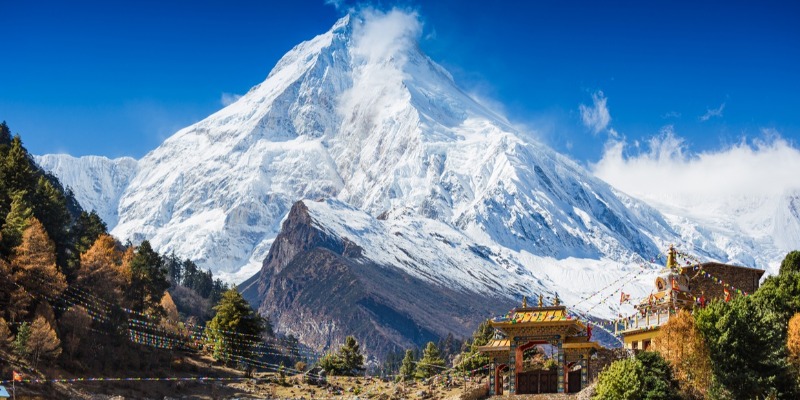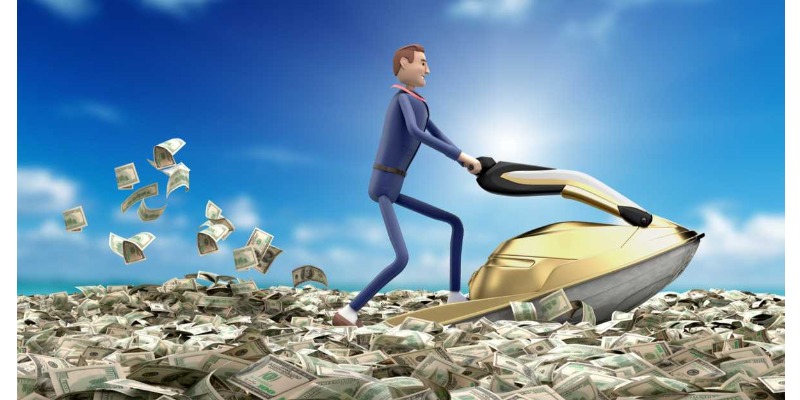
 India: the freeze of the country revises the Himalaya
India: the freeze of the country revises the HimalayaBesieged by pollution, Indian cities live immersed in a permanent haze.A little enviable record of pollution is held by India which, due to its large population, from urban gatherings and from a sublime environmental policy, is counted among the countries that produce the greatest air pollution in the world. Perhaps it is a fact of culture that the environmental problem is not widely felt in the country, so that the sources of pollution are part of the daily life of the population. The use of charcoal for cooking, the crazy traffic made up of means of transport that do not have systems for the reduction of polluting emissions, the habit of burning garbage especially plastic , coal-fired power plants that support the production of electricity , the incineration of stubble in the countryside to prepare new crops and atmospheric emissions from factories. At this moment, China , considered the country that produced the most pollution in the world, is gearing up to deal with a problem that has also become social, public health, leaving India with a sad record. Pollution deaths increased from 740,000 deaths in 1990 to 1,100,000 in 2015 , covering the fourth leading cause of death in India, with a growing progression that never ends, as, for now, an overall project to reduce the polluting sources not seen yet. Despite the launch of the Ncap project , which envisages the reduction of PM 2.5 and PM 10 in metropolitan areas, the results are currently not visible and assessable. In the meantime, the Coronavirus has arrived , which has imposed the lockdown for a few weeks by closing factories, blocking air flights, road traffic, subways, thus giving the country an environmental respite. Following these total restrictions, a drastic reduction in fine dust and other pollutants usually present in Indian skies occurred within two weeks, making new aspects of nature discovered. In some areas of the country, hundreds of kilometers away, we returned to admire the Himalayan chain which, according to the inhabitants of Panjab, had not been seen for 20 years. The children had a marvelous view of a mountain range which they only knew existed in the books.
SEE MORE
 When Capital is Color Blind to Green Investing
When Capital is Color Blind to Green InvestingWe would now seem to have entered a phase of sure interest towards the green economy, of innovative startups that deal with eco-sustainable agriculture, of discoveries for the reduction of atmospheric pollution, of seas and soils, of a mobility with a low carbon footprint ... but is that right? Despite the European Commission chaired by Ursula von der Leyen, it has traced a clear and unambiguous path on a development model more compatible with the needs of the earth and, despite being on the other side of the ocean, the president of the United States, Donald Trump, is rowing in the opposite direction by even withdrawing his country from the Paris climate agreement, the business world is holding the helm straight in deciding how and where to invest the money available. In fact, beyond the state proclamations and people's opinion movements, money moves in the interest of profit which, at times, can be crossed with the interests of politics and opinion public and sometimes not. It cannot be said that social business exists, as money is invested today with ever shorter time horizons than in years, decades or the last century. Thanks to the computerization of economic systems, investors bet on activities that are hoped to have very high returns in a very short time. An example can be seen by observing the performance of some technological stocks and services related to the web, such as Google, Apple, Amazon, Tesla, just to name a few, which have increased their value during the period of the explosion of Covid in a completely surprising way, in an extremely limited space of time, with double-digit percentage growth values. This is unlikely to happen in a traditional economy, and it is increasingly common to see how world capitals turn to businesses with exponential growth in short periods. How is it possible to attract investments in green projects that must change or solve the production, consumption or mobility anomalies that afflict our planet, whose projects take years or decades to implement? Any investor is interested in bringing drinking water to some metropolises, such as Mumbai, where the return on investment would be assured but in the face of the construction of a water network whose times would obviously be long? It would seem not, in fact every day hundreds of trucks bring water to the city, emitting tons of CO2, but there is no capital to modernize the water network and reduce air pollution. This is just one example of the paradox of finance, which affects the maintenance of inefficient and polluting systems, despite having the resources and means to solve environmental problems. Automatic translation. We apologize for any inaccuracies. Original article in Italian.
SEE MORE
 The great world capitals aim for vegetable meat
The great world capitals aim for vegetable meatBill Gates, Google Ventures and Blue Horizon are investing in the new sustainable business That the meat-producing sector is being blamed for being extremely polluting because of emissions into the atmosphere, to the consumption of water and soil for fodder, is an acclaimed fact, but that these problems have led to companies, supported by large capitals, which have challenged a huge and consolidated market such as meat. , was less predictable. The big challenges have always been enjoyed by the big lenders who had decided, again, to invest in a sector that, a few years ago, was considered not only at great risk, but probably a pure entrepreneurial madness. About 8 years ago when the company Beyond Meat,backed by the founder of Microsoft,launched the first production of vegetable burgers,perhaps the times were not ripe and the meat producers had seen, in the operation, a big joke destined for a resounding industrial and financial failure. The company’s intentions were to provide food, not only similar in shape, colour and taste to that of animal derivation, but also aimed to disrupt the slaughter chain of animals and the initiation of an agricultural conversion that would reduce pollution caused by intensive farming. The meat producers of the time were very amused by the ambitious project and sure that the flavor and color of their burgers, was inimitable and not reproducible with plant-derived products. In fact, at the beginning of the production of the vegetable burgers, neither the taste nor the appearance of the product were comparable to animal meat, but the company stubbornly continued its research to refine taste and appearance. Meanwhile, three other players entered the market: Impossible Food, which was supported by Google Ventures, Livekindly supported by the Swiss of Blue Horizon and Temasek that deals with the entire production chain from the field to the product on the table. Over time, the natural aromatic compounds inserted into the vegetable burgers and the use of yellow pea, soybeans and beet juice to change the color and flavor, to make it similar to Heme, the group of iron-based molecules that gives animal meat its characteristic flavor, surprisingly brought the plant product closer to the animal product. Moreover, in recent years, the ecological sentiment that has pervaded public opinion, has put in another light both the meat production sector, in negative, and that of the vegetable production of burgers, considering the new supply chain and the new product completely in line with the green expectations of consumers. Capital, meanwhile, has flowed copiously on these projects considering that the world market for beef is estimated at around 2700 billion dollars and that today, alternative protein producers cover about 1 in the market, but with a growth of 20 per year. Companies such as Beyond Meat, last year, had a value on Wall Street of about 12 billion dollars and, companies in the sector, do not struggle to rake in financing given the potential for market growth.Automatic translation. We apologize for any inaccuracies. Original article in Italian.
SEE MORE
 European green deal: where is Europe going?
European green deal: where is Europe going?Circular Economy and European Green Deal: Ursula Von der Leyen alone after the Cop25 failure in Madrid. The President of the European Commission, Ursula Von der Leyen , after the failure of the assembly of the main countries of the world, who met in Madrid to discuss the dramatic environmental situation , in the hope of accelerating the achievement of the Paris objectives, found herself definitely alone. For various reasons, as described in the Portal NEWS pages a few days ago, the major polluters of our planet such as the United States, China, Brazil, India and Russia have not only given no availability to respect the established environmental limits previously but some of them even asked to exit the Paris agreement. The sentiment shared by these countries is that of being free to produce and pollute at their convenience, without the need to submit to strict rules and controls, with the consequence of becoming more commercially competitive on the market than those countries that comply with environmental regulations. It would seem it was a great disappointment, first of all political, on the part of the European Union, which finds itself carrying out this battle on safeguarding the planet by itself. But despite the failures of Madrid, the president of the European commission has decided to continue his fight against climate change and pollution, launching the “European Green Deal” program which expresses the community’s desire to make Europe the first continent to zero impact by 2050. Through new legislative proposals and substantial Community funding that the president wants to put into action, within two years, he wants to get to control emissions, to create a green market, also in the working field and to push innovation, a painful point compared to nations. like China and USA. The new Community policy will affect several sectors: agriculture, industry, energy, technology, transport and chemistry. There are still some EU countries that are opposed or skeptical of the new program, especially those in the east, linked by a double thread to coal for the production of electricity. Poland, the Czech Republic and Hungary would like to postpone the start of the plan to have more time to convert their plants from coal to a cleaner energy source. Certainly the plan is ambitious and demanding, as it involves not only the technological adaptation of obsolete and polluting energy production systems, such as coal, but also the finding of enormous economic resources, around 100 billion a year , to be invested to help Eastern European countries to achieve carbon neutrality by 2050. Resources that today are not easy to find among the countries of the European community. But there is also an important aspect to keep in mind, which concerns the commercial disadvantage of products made within the European market , governed by stringent environmental standards, compared to countries that have the right to derogate from these commitments, thus becoming more competitive. from a commercial point of view. To face this problem, a return on public investment in strategic sectors such as technology, industrial and energy is being considered. This could serve to decrease the differential between the cost of European production and that of other countries that produce energy from fossil sources. However, public investment is not the only thought that Brussels has to help European companies to remain competitive in exports, but it is also thinking of a sort of “Carbon Tax”, a tax for polluters, aimed at goods from those countries. that produce and export their goods, using non-green energy, therefore less expensive and more polluting. In chain, ideas could be aggregated about the blockade of the free trade agreement between Europe and Mercosur, affecting the Brazilian meat trade , as the president of Brazil, Bolsonaro , is held responsible for the deforestation of the Amazon , with all the related environmental consequences. The intentions are good, but the process of completing the new green plan involves a lot of politics and a lot of money, two things to be taken with a grain of salt.See more info about topicAutomatic translation. We apologize for any inaccuracies. Original article in Italian.
SEE MORE